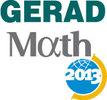HEC Montréal, Canada, 6 - 8 mai 2013
Journées de l'optimisation 2013
HEC Montréal, Canada, 6 — 8 mai 2013

MB8 Santé: optimisation des flux de patients et de ressources / Healthcare: Patient and Resource Flow Optimization
6 mai 2013 15h30 – 17h10
Salle: Demers Beaulne
4 présentations
-
 15h30 - 15h55
15h30 - 15h55Home Care Routing with Synchronization Constraints
Routing of homecare workers is integrated with visit allocations. Each visit requires competences and has a time window. Some visit requires synchronization between workers. In addition there are multiple objectives including quality, efficiency, fairness and preferences. We describe solution methods and a decision support system used in the Nordic countries.
-
 15h55 - 16h20
15h55 - 16h20Planning Healthcare and Social Services for an Aging Population: Simulation Model for the Continuum of Care for Elderly in Québec
In Québec, the population aged 75 years and over will almost double to reach over 1 million individuals by 2031. Considering that gains in life expectancy are not associated with a compression of morbidity so far, the demand for health and long-term care services will continue to increase. Financial resources being limited, efficiency is of utmost importance, and decision makers need a better understanding of the relationships between demand, capacity, their mismatch, and management policies of resource allocation within the continuum care. Therefore, modelling and simulation has the potential to provide the information required to plan healthcare delivery proactively.
The aim of this project is to create a model that represents the best possible the patient flows within the continuum for elderly care. The preliminary model represents the flow of elderly patients through the system. Although most live independently initially, many have or will develop disabilities at known yearly rates for the 14 autonomy profiles described using the provincial toolset. Services are sought at different institutions: community services, GPs, emergency departments, hospitals, rehabilitation facilities, and long term care facilities. Administrative data collected over the last 10 years in one of the 16 regions in Québec will be used to validate our model and understand the dynamics of this system, estimate distributions of operating measures, evaluate the gradient effects of overflows, both in quantity and time. Several scenarios and management policies impacting different service points will be tested to allow optimization.
Therefore, using simulation, a proactive, dynamic and organized management approach will be possible in Québec to face the healthcare challenges linked to an aging population. We expect our modelling and simulating approach to be used in other regions of Quebec thereafter.
-
 16h20 - 16h45
16h20 - 16h45Modeling of Patient Flow in the New Emergency Room of the Jewish General Hospital at Montreal
The aim of this project is to identify and model all the different external and internal circulation flows associated with the new emergency room of the Jewish General Hospital of Montreal, currently under construction. The data base was built by using historical medical records, and then some data-mining techniques were applied, after which we found some general and repeated trajectories for patients. A second model was built for the medical staff. The final result was a general circulation model that can be used as a decision tool for some policies like the logistics schedule (food, pharmacy, etc.) or the elevators policies (i.e. dedicated periods of time).
-
 16h45 - 17h10
16h45 - 17h10Collaboration Mechanisms in Reverse Supply Chains
This study, as a first research on a pharmaceutical RSC decision-making model, contributes to the literature by modeling a pharmaceutical RSC, exploring the role of collaboration approaches in facilitating the recovery process, determining the proper techniques to share RSC’s savings and comparing the effect of non-collaborative and collaborative approaches.

